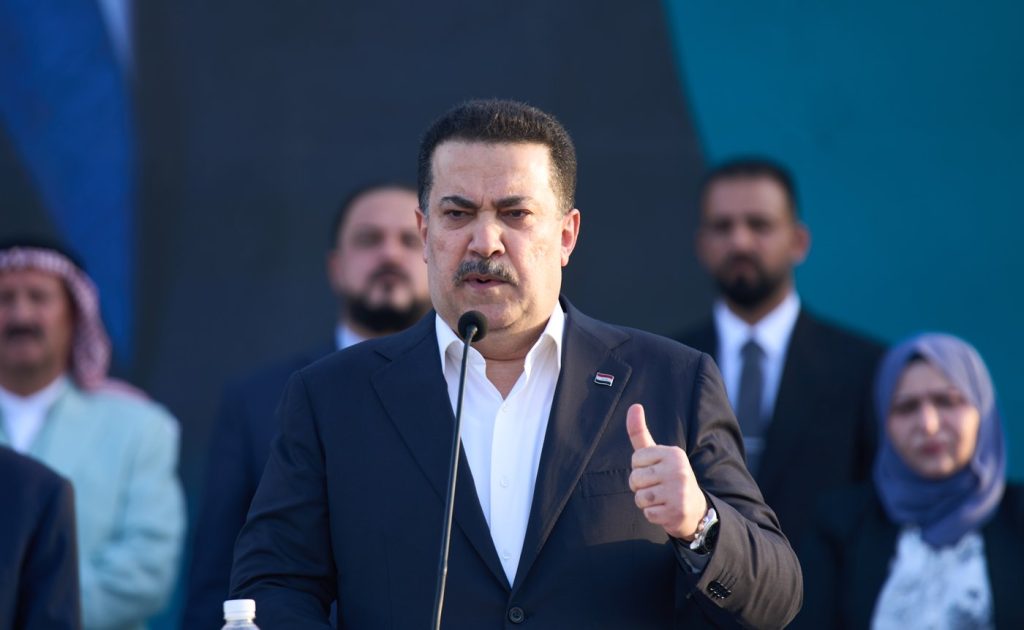Top Stories
Iraq Retains US Military Advisers Amid Ongoing IS Threat

Iraq’s Prime Minister, Mohammed Shia al-Sudani, announced on Monday that a small contingent of U.S. military advisers will remain in Iraq to assist in the fight against the Islamic State group in Syria. This decision comes despite an agreement to reduce American military presence in Iraq by September 2023, which aimed to see U.S. forces withdraw from several bases.
During a press briefing in Baghdad, al-Sudani explained that U.S. military advisers and support personnel are currently stationed at both the Ain al-Asad air base in western Iraq and the al-Harir air base in northern Iraq. He noted that while a full withdrawal from Ain al-Asad was initially planned, “developments in Syria” necessitated the continuation of a small unit of between 250 and 350 advisers and security personnel at the base. Their primary role will be to support counter-ISIS surveillance and coordinate efforts with the al-Tanf base in Syria.
Concerns regarding a resurgence of the Islamic State group have heightened, particularly following the fall of former Syrian President Bashar Assad during a rapid rebel offensive in December. Al-Sudani acknowledged these fears, stating that the group, which once controlled large territories in both Iraq and Syria, “no longer poses a significant threat inside Iraq.”
Balancing relationships with both the United States and Iran remains a critical aspect of Iraq’s foreign policy. Al-Sudani emphasized a commitment to ensuring that Iraq does not become a proxy in regional conflicts. “We put Iraq first, and we do not wish to act as a proxy for anyone,” he asserted. He further called on the U.S. to resume negotiations with Iran, describing the previous administration’s “maximum pressure” approach as “counterproductive.”
In addition, tensions have flared between Baghdad and Washington regarding the presence of Iran-backed militias within Iraq. The Popular Mobilization Forces, a coalition of militias formed to combat the Islamic State, was integrated into the Iraqi military in 2016, yet continues to operate with considerable autonomy. Although al-Sudani did not directly address proposed legislation that would strengthen ties between the Iraqi military and the PMF, he reiterated his government’s commitment to disarmament and national dialogue.
“We encourage all factions to either integrate into state institutions or engage in political life,” he stated, suggesting the possibility of political parties emerging from armed factions. With parliamentary elections scheduled for next month, al-Sudani remarked that armed groups that have transformed into political entities have the constitutional right to participate in the democratic process.
As Iraq prepares for these pivotal elections, the outcome will significantly influence whether al-Sudani secures a second term in office. The prime minister’s stance on militia integration and negotiations with Iran will likely play a crucial role in shaping the country’s political landscape moving forward.
-

 Education3 months ago
Education3 months agoBrandon University’s Failed $5 Million Project Sparks Oversight Review
-

 Science4 months ago
Science4 months agoMicrosoft Confirms U.S. Law Overrules Canadian Data Sovereignty
-

 Lifestyle3 months ago
Lifestyle3 months agoWinnipeg Celebrates Culinary Creativity During Le Burger Week 2025
-

 Health4 months ago
Health4 months agoMontreal’s Groupe Marcelle Leads Canadian Cosmetic Industry Growth
-

 Science4 months ago
Science4 months agoTech Innovator Amandipp Singh Transforms Hiring for Disabled
-

 Technology4 months ago
Technology4 months agoDragon Ball: Sparking! Zero Launching on Switch and Switch 2 This November
-

 Education4 months ago
Education4 months agoRed River College Launches New Programs to Address Industry Needs
-

 Technology4 months ago
Technology4 months agoGoogle Pixel 10 Pro Fold Specs Unveiled Ahead of Launch
-

 Business3 months ago
Business3 months agoRocket Lab Reports Strong Q2 2025 Revenue Growth and Future Plans
-

 Technology2 months ago
Technology2 months agoDiscord Faces Serious Security Breach Affecting Millions
-

 Education4 months ago
Education4 months agoAlberta Teachers’ Strike: Potential Impacts on Students and Families
-

 Science4 months ago
Science4 months agoChina’s Wukong Spacesuit Sets New Standard for AI in Space
-

 Education3 months ago
Education3 months agoNew SĆIȺNEW̱ SṮEȽIṮḴEȽ Elementary Opens in Langford for 2025/2026 Year
-

 Technology4 months ago
Technology4 months agoWorld of Warcraft Players Buzz Over 19-Quest Bee Challenge
-

 Business4 months ago
Business4 months agoNew Estimates Reveal ChatGPT-5 Energy Use Could Soar
-

 Business4 months ago
Business4 months agoDawson City Residents Rally Around Buy Canadian Movement
-

 Business4 months ago
Business4 months agoBNA Brewing to Open New Bowling Alley in Downtown Penticton
-

 Technology2 months ago
Technology2 months agoHuawei MatePad 12X Redefines Tablet Experience for Professionals
-

 Technology4 months ago
Technology4 months agoFuture Entertainment Launches DDoD with Gameplay Trailer Showcase
-

 Technology4 months ago
Technology4 months agoGlobal Launch of Ragnarok M: Classic Set for September 3, 2025
-

 Technology4 months ago
Technology4 months agoInnovative 140W GaN Travel Adapter Combines Power and Convenience
-

 Top Stories3 months ago
Top Stories3 months agoBlue Jays Shift José Berríos to Bullpen Ahead of Playoffs
-

 Science4 months ago
Science4 months agoXi Labs Innovates with New AI Operating System Set for 2025 Launch
-

 Technology4 months ago
Technology4 months agoNew IDR01 Smart Ring Offers Advanced Sports Tracking for $169










